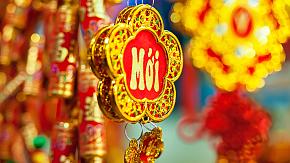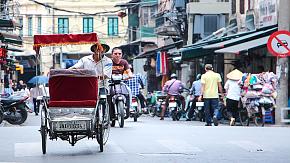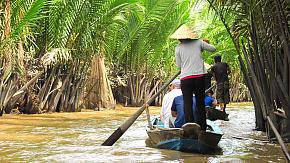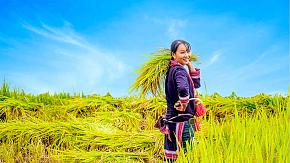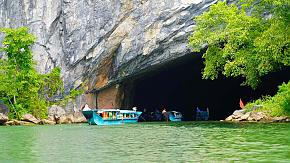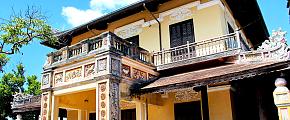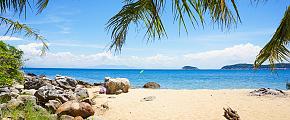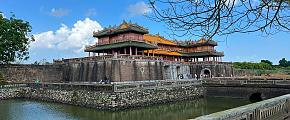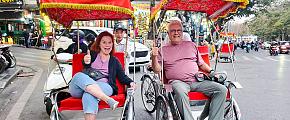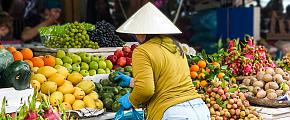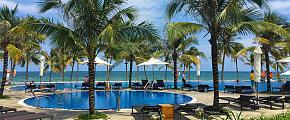Top 10 Vietnam Festivals to Celebrate in 2026
Because of its history and geography, Vietnam has a distinctive holidays and festivals. You can participate in some of them to experience the culture when you travel to Vietnam. This article will introduce the top 10 festivals in Vietnam to you.
Vietnamese New Year (Tet)
Tet, the name for the Vietnamese New Year, is an abbreviation of Tet Nguyen Dan, which signifies a feast on the first day of the year. Having Chinese roots, this festival also occurs on the first day of each lunar year as Chinese New Year and holds between January and February. The Tet Festival in 2026 is celebrated on February 17.
Vietnamese people traditionally visit the graves of their ancestors before Tet, decorate their homes with flowers and red flags, and prepare the traditional dish Banh Tet. People visit pagodas on New Year's Eve to pray for luck and health. This is a necessary activity for Vietnamese people to participate in the New Year and has evolved into the cultural and spiritual beauty of the nation. Children will receive red envelopes from their parents and other adults on the first day of the New Year. There are lion dance parades throughout the city, and firecrackers and gongs are used in the streets to scare off evil spirits. Vietnamese New Year, the most important festival in Vietnam, is a must-experience if you travel during this time.
Mid-Autumn Festival / Full Moon Festival
The Mid-Autumn Festival, which was influenced by Chinese culture, is also observed in Vietnam on the 15th day of the eighth lunar month the same as Chinese Moon Festival.
Vietnamese people go out to march with lanterns of different forms and colors on the day of the year when the moon is at its fullest. There is a saying that the agrarian civilization is where the Mid-Autumn Festival first appeared because in ancient times, people would pray to the full moon for a good harvest. People would conduct festivities to commemorate the colder weather and agricultural harvesting that occurred in the middle of the eighth lunar month.
The Vietnamese Mid-Autumn Festival must include lion dances and mooncakes. Children's groups perform in the street and then enter houses during the festival's nighttime, which is said to bring the residents good fortune. Round or square in shape, Banh Trung Thu is a classic rich mooncake box made primarily of lotus seeds and powdered beans.
Hoi An Lantern Festival
The Hoi An Lantern Festival takes place on the fourteenth day of the first lunar month. It serves as a reminder of the year's first full moon. The full moon has particular significance for both Buddhist believers and skeptics in Vietnam.
To pray for good things for themselves and their loved ones, they burn lanterns before descending to the river. Every spring, towns in rural Vietnam host Bai Choi's combination of sports and singing, which has been listed as a UNESCO world cultural site. The sparkling realm of innumerable lanterns will surround visitors. The streets are packed with people who join numerous outdoor events to celebrate. The river is filled with a riot of color as boats, candles, and lanterns travel across the water.
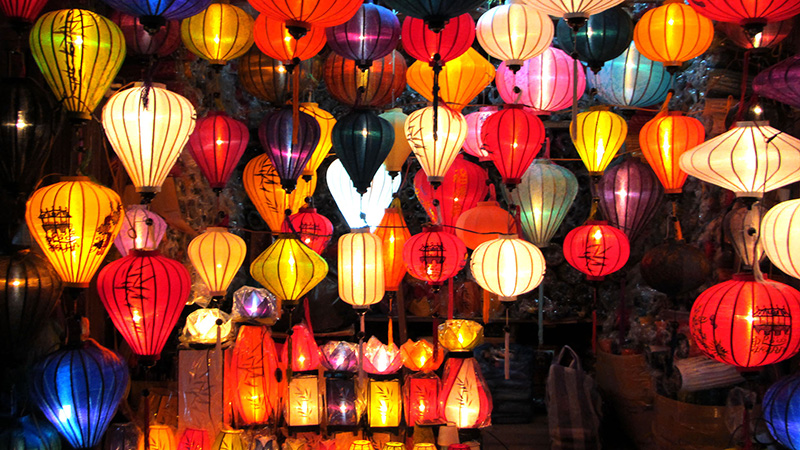 Hoi An Lantern Festival
Hoi An Lantern Festival
Hue Festival
Hue City hosts the Hue Festival, a significant cultural event, every two years. The day was first established to celebrate the cultural and historical significance of the former capital of Vietnam.
The celebration of Hue's emancipation holds a variety of events, including the Royal New Year, rich and distinctive folk customs connected with the Spring Festival, traditional Spring Festival cultural spaces, and spring entertainment activities at the historic Hue Castle. Several performers recreate numerous historical moments from the Nguyen Dynasty, providing viewers with a glimpse into feudal Vietnam. Visitors may sample cuisine from all throughout Vietnam while watching chess, rowing, and other sporting events.
Perfume Pagoda Festival
The Perfume Pagoda is one of the most well-known pilgrimage sites in Vietnam. After the Spring Festival, the Perfume Pagoda Festival gets under way. Despite the fact that the exact date varies from year to year, it often begins in January or February and lasts until the end of March.
The Vietnamese view this area as a sanctuary for the worship of Buddha and Avalokitesvara. It is a sizable organization, and at this time, tourists from all over the world can be seen swarming there. Huong Tich Cave prayer is one of the festival's most significant events. People touch the golden trees in this area and pray for money in addition to for the blessing of children. Magnificent dragon dances are done amid the Trinh pagodas on the sixth day of the first month.
The Perfume Pagoda will be filled with the smell during the celebration. Many tourists come here to soak in the picturesque surroundings, chilly temperatures, and rising cigarette smoke, which together create a tranquil ambiance that penetrates deeply into the body and psyche. Numerous activities, including boating, hiking, cave exploration, and attending musical concerts, are available to visitors.
Wandering Souls Day
Wandering Souls Day occurs every year on the fifteenth day of the seventh lunar month. This festival is often regarded as the second most significant holiday in Vietnam since it is observed by all Vietnamese who believe in the existence of God, including both good and evil.
According to legend, the gates of hell open on this day around dusk, letting naked and starving souls escape. Those who have family there return home and find lots of food on their family altars. Large tables are therefore covered in offerings throughout the event, including meat and fruit. To pay respect to the departed, they burn cash and clothing made of shredded paper.
Lim Festival
The major day of Lim Festival is the 13th day of the first lunar month. It is a Quan Ho singing event and was designated an Intangible Cultural Heritage by UNESCO in 2009. Lim Festival is a distinctive artistic and cultural activity of the ancient northern civilization. Love duet, which contains characteristics of northern lyrical folk music, has become a staple of Vietnamese culture.
On the day of the event, hundreds of residents march together for more than a kilometer beginning at 8 am while wearing vibrant traditional costumes. In Noi Due, elders and local leaders would go to the Hong Van Mausoleum to participate in a religious rite. To honor the local deities, men and female singers would line up in front of the tomb's gate and sing.
Reunification Day
The collapse of the Saigon administration, the conclusion of the Vietnam War, and the liberation of southern Vietnam all occurred on April 30, 1975. Since that time, April 30 has been observed as a national holiday in Vietnam to commemorate the formal end of the war. On that day, buildings all around the nation fly the national flag in remembrance of those who gave their lives in service to their nation.
Even in Hanoi and Ho Chi Minh City, the streets are decked with vibrant banners, flags, and neon lights in the days before the festival. Many Vietnamese people will decide to go home because it falls on the day before Labor Day. Many Vietnamese people also choose this time to travel, all the streets will be relatively busy.
Buddha Birthday
Buddhists in Vietnam will commemorate Buddha's birth, enlightenment, and death on Vesak Day in April or May. It is believed that many Vietnamese people practice Buddhism, even though the festival is not a recognized national holiday, Vietnamese people value it highly. As lotus flowers blossom and emerge from the soil, temples are primarily decked with them during the Vesak Day festivities.
It is furthermore thought of as spiritual cleansing and enlightenment. At Buddhist pagodas, temples, and other places of worship around the nation, the event is joyfully observed. Additionally, monks will make lectures and direct prayers. Candles are lighted and placed on lanterns shaped like lotus flowers during Vesak. After that, they are placed in rivers and lakes to float. They believed it would disseminate the spirit of the Buddha.
Vietnam Independence Day
The first Independence Day in Vietnam was celebrated on September 2, 1945. The Declaration of Independence, officially declared Vietnam free from French colonial rule, was read that day by Ho Chi Minh, the nation's first president, at Ba Dinh Square, the main square in Vietnam, in front of a massive crowd. With this, Vietnam officially changed from a feudal to a democratic republic.
Vietnam has celebrated its independence on September 2 every year since. Hanoians still use Ba Dinh Square today for parades on major occasions, as well as daily ceremonies to raise and lower the national flag. On Vietnam Independence Day, a range of events is held. All around the nation, parades and fireworks displays are planned for the streets. These events could go on for two days in certain regions.
In participating in these festival celebrations, visitors can experience different Vietnamese cultures. Most festivals in Vietnam are very popular, so if you're interested, choose your favorite one to join in and discover the local culture! If you want to find a travel expert to plan such a trip, just feel free to let us know, we can tailor a Vietnam tour to your needs and budget.
Related Posts You May Like
What Our Clients Say
Explore the latest verified reviews of Odynovo's travel services on Tripadvisor, Google, Trustpilot, Product Review and more trusted platforms.

